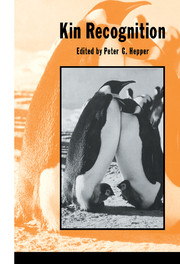Book contents
- Frontmatter
- Contents
- List of contributors
- Preface
- Introduction
- 1 The correlation between kinship and behaviour in non-human primates
- 2 Co-operation and reciprocity in birds and mammals
- 3 Kinship and fellowship in ants and social wasps
- 4 Successes and failures of parent–offspring recognition in animals
- 5 Kinship, kin discrimination and mate choice
- 6 Genetic components of kin recognition in mammals
- 7 Kin recognition in amphibians
- 8 Kin recognition cues of vertebrates
- 9 Recognizing kin: ontogeny and classification
- 10 Parental states as mechanisms for kinship recognition and deception about relatedness
- 11 Fetal learning: implications for the development of kin recognition
- 12 Information processing and storage during filial imprinting
- 13 The honey bee as a model kin recognition system
- 14 Mutual mother–infant recognition in humans
- Author index
- Species and common name index
- Subject index
14 - Mutual mother–infant recognition in humans
Published online by Cambridge University Press: 06 January 2010
- Frontmatter
- Contents
- List of contributors
- Preface
- Introduction
- 1 The correlation between kinship and behaviour in non-human primates
- 2 Co-operation and reciprocity in birds and mammals
- 3 Kinship and fellowship in ants and social wasps
- 4 Successes and failures of parent–offspring recognition in animals
- 5 Kinship, kin discrimination and mate choice
- 6 Genetic components of kin recognition in mammals
- 7 Kin recognition in amphibians
- 8 Kin recognition cues of vertebrates
- 9 Recognizing kin: ontogeny and classification
- 10 Parental states as mechanisms for kinship recognition and deception about relatedness
- 11 Fetal learning: implications for the development of kin recognition
- 12 Information processing and storage during filial imprinting
- 13 The honey bee as a model kin recognition system
- 14 Mutual mother–infant recognition in humans
- Author index
- Species and common name index
- Subject index
Summary
Introduction
Kin recognition, especially the failure to recognize close relatives, is a commonly occurring theme in the history and literature of western civilization. Sophocles' tragic tale of Oedipus is perhaps the best known example of kin recognition gone awry. Oedipus followed the inadvertent murder of his father (Laius) by unknowingly marrying his own mother (Jocasta). According to the Old Testament (Genesis 27:27) an error in kin discrimination enabled Jacob to cheat his older brother Esau out of his birthright. By disguising himself as Esau, Jacob deceived their father (Isaac) into granting him the final blessing and inheritance intended for the first born son. Similarly, the fate of Odysseus (Ulysses) was ultimately decided by his inability to identify one of his offspring. On his final voyage, Odysseus launched an attack against Telegonus – his son born of the goddess Circe. Only after being mortally wounded by the younger man did the hero of Homer's saga learn of their relationship.
Despite such long-held fascination with the consequences of kin recognition errors, humans are evidently quite proficient at recognizing family members (as well as other individuals). Nonetheless, there is little knowledge of the scope of human kin recognition capabilities or the underlying bases of this form of social discrimination. As recently pointed out by Wells (1987), in comparison to research with various non-human species, there have been relatively few empirical studies of kin recognition in our own species.
- Type
- Chapter
- Information
- Kin Recognition , pp. 413 - 432Publisher: Cambridge University PressPrint publication year: 1991
- 29
- Cited by

